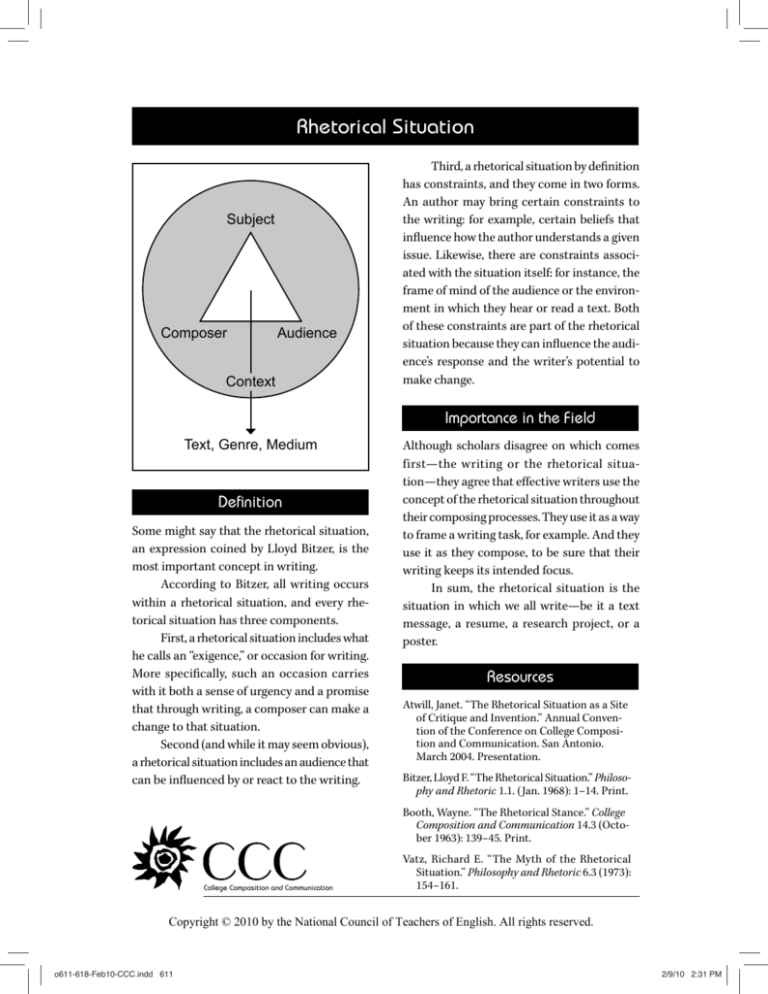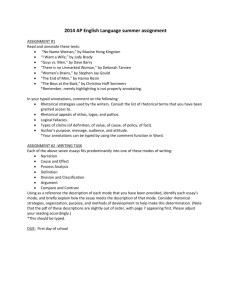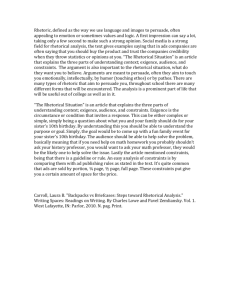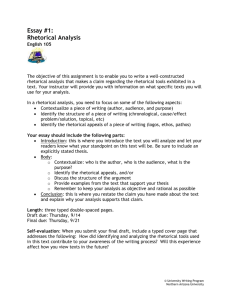
Rhetorical Situation
Subject
Composer
Audience
Context
definition
Third, aarhetorical
rhetoricalsituation
situationbyby
definihas constraints,
and they
in twoin
forms.
tion
has constraints,
and come
they come
two
An
author
may
bring
certain
constraints
to
forms. An author may bring certain conthe
writing:
for
example,
certain
beliefs
that
straints to the writing, for example certain
influence
how
author
given
beliefs
that
inflthe
uence
howunderstands
the author aunderissue. Likewise,
thereLikewise,
are constraints
associstands
a given issue.
there are
conated
with
the
situation
itself:
for
instance,
the
straints associated with the situation itself,
frame
of
mind
of
the
audience
or
the
environfor instance the frame of mind of the audimentor
in the
which
they hear or
ence
environment
in read
whicha text.
they Both
hear
of these
part ofconstraints
the rhetorical
or
read aconstraints
text. Both are
of these
are
situation
because
they
can
influence
the
audipart of the rhetorical situation because they
ence’s
and theresponse
writer’s potential
to
can
inflresponse
uence audience
and the pomake change.
tential
of the writer to make change.
Importance in the Field
Text, Genre, Medium
Definition
Some might
might say
say that
that the
the rhetorical situation,
an expression coined
coined by
by Lloyd
Lloyd Bitzer,
Bitzer, is the
most important
importantconcept
conceptin
inwriting.
writing.
According to Bitzer, all
all writing
writing occurs
within a rhetorical situation,
situation, and
and every
every rhetorical situation
has
three
components.
situation has three components.
First, a arhetorical
rhetorical
situation
includes
situation
includes
what
what
hean
calls
an “exigence,”
or occasion
for
he calls
“exigence,
” or occasion
for writing.
writing.
More specifi
cally,
an occasion
More specifically,
such
an such
occasion
carries
carries
with aitsense
bothofa urgency
sense ofand
urgency
and
with it both
a promise
athat
promise
that
through
writing, acan
composer
through
writing,
a composer
make a
can
make
change
to that situation.
change
to athat
situation.
Second (and
(andwhile
whileit may
it may
seem
obviseem
obvious),
ous),
a
rhetorical
situation
includes
an
a rhetorical situation includes an audienceaudithat
ence
that
can be infl
react
to the
can be
influenced
byuenced
or reactby
toor
the
writing.
writing.
CCC
College Composition and Communication
Although
Although scholars
scholars disagree
disagree on
on which
which comes
fifirst—the
rst—the writing
or or
thethe
rhetorical
situation—
writing
rhetorical
situathey
agree that
writerswriters
use the
tion—they
agreeeffective
that effective
useconthe
cept
of the
situation
throughout
their
concept
of rhetorical
the rhetorical
situation
throughout
composing
processes.
TheyThey
use ituse
asitaasway
to
their composing
processes.
a way
frame
a writing
task,task,
for example.
AndAnd
theythey
use
to frame
a writing
for example.
ituse
as it
they
to be sure
their
writing
as compose,
they compose,
to bethat
sure
that
their
keeps
itskeeps
intended
focus. focus.
writing
its intended
In
the rhetorical
rhetorical situation
situation is
In sum, the
is the
situation
situationinin which
which we
we all
all write—be
write—be it a text
message;
a researchproject,
project or
anda
message, aa resume;
resume,ora research
poster.
poster.
Resources
Enos,
Leo.Rhetorical
“The History
of Rhetoric.”
Atwill,Richard
Janet. “The
Situation
as a Site
Coming
of Age:
The Advanced
Writing
Curof Critique
and Invention.”
Annual
Convention of the
on CollegeRebecca
Composiriculum.
Ed.Conference
Linda K. Shamoon,
tion and
Communication.
San Antonio.
Moore
Howard,
Sandra Jamieson,
and Robert
March 2004.Portsmouth:
Presentation.
Schwegler.
Boynton/Cook, 2000.
81–86.
Print.
Bitzer,
Lloyd
F. “The Rhetorical Situation.” Philosophy and Rhetoric 1.1. (Jan. 1968): 1–14. Print.
Lowe, Kelly. “Against the Writing Major.” ComBooth,
Wayne.
“The35.1
Rhetorical
College
position
Studies
(2007):Stance.”
97–98. Print.
Composition and Communication 14.3 (Octo-
Lunsford,
Andrea
A. “The
ber 1963):
139–45.
Print.Future of Writing
Programs—and WPAs.” Plenary Address.
Vatz,
Richard of
E. the
“The
Myth of
ofWPA.
the Rhetorical
Conference
Council
Grand
Situation.” Philosophy and Rhetoric 6.3 (1973):
Hyatt, Denver. 10 July 2008. Address.
154–161.
Copyright © 2010 by the National Council of Teachers of English. All rights reserved.
o611-618-Feb10-CCC.indd 611
PosterPage_100026.indd 1
2/9/10 2:31 PM
12/23/2009 11:17:15 AM










